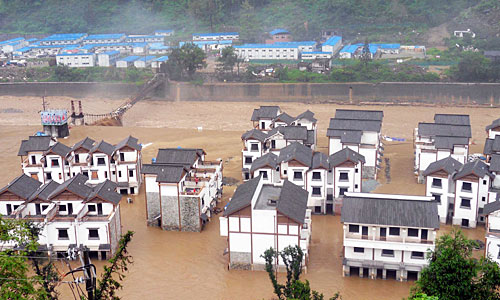|
 |
|
ANOTHER HIT: A new settlement in Yingxiu Township, Sichuan Province, built for survivors of a catastrophic earthquake in 2008 is submerged in floods on August 14 (WEN XIN) |
China has been suffering from a string of rain-triggered geological disasters recently as the country battles its worst floods in more than a decade.
More than 250,000 residents have been safely evacuated in northeast China's Liaoning Province after torrential rains caused waters to rise to the highest level in more than 10 years along the Yalu River on the border of China and the Democratic People's Republic of Korea (DPRK), local officials said on August 22.
Floods killed at least four people in Dandong, a border city facing Sinuiju City in the DPRK, as heavy rainfall began on August 19. On August 21, the water level at one monitoring station on the Yalu River in Dandong rose to 2.35 meters above the warning line, the highest in a decade and the second highest since records began being kept in 1934.
Rainstorms began battering south China at the end of April and as of May 16 had killed at least 101 people, affected more than 15 million and brought about direct economic losses of more than 8 billion yuan ($1.2 billion) in 11 provinces and autonomous regions, China News Service reported. The rainstorms triggered flash floods and mud-rock flows, swollen rivers, burst dikes, threatened reservoirs and damaged highways, bridges, power and telecom facilities.
Explaining an increase of extreme weather events, such as torrential rains and record high temperatures, seen in vast areas in China this year, Jiao Meiyan, Deputy Director of China Meteorological Administration, said on August 22 that the immediate cause was abnormal atmospheric circulation. The most recent El Nino event, a warming of the surface water of the eastern and central equatorial Pacific Ocean that occurs every four to 12 years and causes unusual global weather patterns, started in June 2009 and ended in May this year.
Jiao said that global warming was the other contributing factor of the rise of extreme weather events worldwide for it disturbs energy distribution in the atmosphere, ocean and atmospheric circulations and temperature distribution in the atmosphere.
Jiao said this year's weather has been very much like that in 1998 when China experienced massive floods of parts of the Yangtze River, as the concluded El Nino event has been followed by La Nina conditions. She predicted that most parts of China would experience a wetter-than-average fall and a dry and cold winter.
Compared with havoc caused by floods nationwide, geological disasters triggered by rains were more devastating. The most catastrophic one was the landslides hitting Zhouqu County, Gansu Province, in early August, which leveled hundreds of houses, clogged a major river and left at least 1,435 people dead and more than 300 missing.
China recorded more than 26,000 geological disasters in the first seven months of this year and the total number for the first half of this year was nearly 10 times those of last year, said Xinhua News Agency.
The disasters, ranging from landslides to ground subsidence, left 843 people dead or missing and led to direct economic losses of more than 3.34 billion yuan ($491 million), Minister of Land and Resources Xu Shaoshi told Xinhua on August 19.
| 